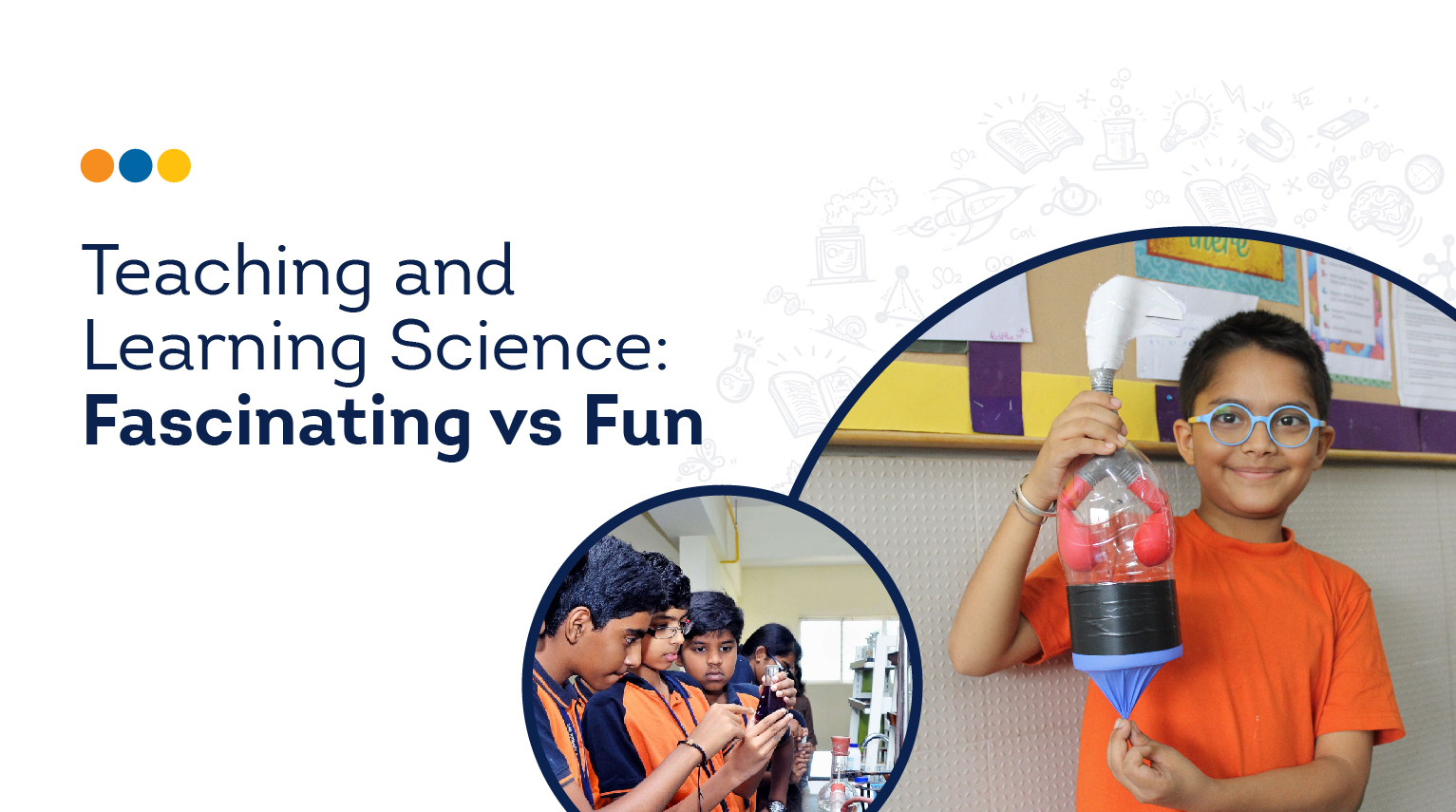News & Events / Teaching and Learning Science: Fascinating vs Fun
category
Academics
Somewhere in a school – the teacher: “students, please write down Newton’s Third Law of motion- Every action has an equal and opposite reaction.”
Students accept the teacher’s words, write down the law and learn it.
Elsewhere in another school- “Teacher: “students, I have a few supplies like straws, balloons, tape, sheets, etc. Can you make a car that moves?” Students work to achieve the goal. Some succeed and some do not. The teacher discusses the reasons for both and encourages students to arrive at Newton’s Third Law. – That is The Brigade Schools for you. Students are taught science in a fascinating and fun way but with a scientific process.
We are very often told that science should be taught and learned in a fun way by performing a set of activities designed to explain a concept. But as a teacher with almost four decades of experience, I beg to differ. In trying to make science entertaining, the actual concept is watered down and made to appear like magic tricks. As children grow up and learn complicated concepts without the fun element, they struggle to understand the subject. What is a better approach? ‘Learning by Doing’- thereby making Science engrossing and entertaining for the little scientist trying to find answers to various processes we take for granted. Schools must encourage students to have a scientific temperament and follow a scientific process.
How do you encourage ‘scientific temperament in students? Allow them to think, ask questions, and find answers to these questions.
Next comes the scientific process. The basic steps to be followed by teachers who want to get their students interested in science and make them confident to face the learning of more complicated concepts as they grow older are:
Identify a phenomenon or observation
Make a hypothesis
Experiment to verify the hypothesis (students should be encouraged to devise activities)
Analyse the results and infer
I have been asked by faculty members how one becomes a good science teacher. Well, I have always said that science teachers are at an advantage. They do not have to try very hard. Kids are curious by nature and all that the teacher needs to do is encourage them to find answers. Their inquisitive minds should be channelised to understand and figure out the science behind various phenomena.
An interdisciplinary approach to teaching science can make it an enriching learning experience for the students. Integrating math with science to collate their results, reading and comprehension to infer their data, and technology to create simulations to prove their hypothesis are just a few examples.
Encouraging understanding of concepts, avoiding rote memorising, and using open-ended questions to assess the student’s learning are some practices that a teacher should use to make science teaching and learning more meaningful. In conclusion, I would like to say that teaching and learning science should be fascinating and captivating rather than fun.
– Jyoti Venkatesh
Elsewhere in another school- “Teacher: “students, I have a few supplies like straws, balloons, tape, sheets, etc. Can you make a car that moves?” Students work to achieve the goal. Some succeed and some do not. The teacher discusses the reasons for both and encourages students to arrive at Newton’s Third Law. – That is The Brigade Schools for you. Students are taught science in a fascinating and fun way but with a scientific process.
We are very often told that science should be taught and learned in a fun way by performing a set of activities designed to explain a concept. But as a teacher with almost four decades of experience, I beg to differ. In trying to make science entertaining, the actual concept is watered down and made to appear like magic tricks. As children grow up and learn complicated concepts without the fun element, they struggle to understand the subject. What is a better approach? ‘Learning by Doing’- thereby making Science engrossing and entertaining for the little scientist trying to find answers to various processes we take for granted. Schools must encourage students to have a scientific temperament and follow a scientific process.
How do you encourage ‘scientific temperament in students? Allow them to think, ask questions, and find answers to these questions.
Next comes the scientific process. The basic steps to be followed by teachers who want to get their students interested in science and make them confident to face the learning of more complicated concepts as they grow older are:
Identify a phenomenon or observation
Make a hypothesis
Experiment to verify the hypothesis (students should be encouraged to devise activities)
Analyse the results and infer
I have been asked by faculty members how one becomes a good science teacher. Well, I have always said that science teachers are at an advantage. They do not have to try very hard. Kids are curious by nature and all that the teacher needs to do is encourage them to find answers. Their inquisitive minds should be channelised to understand and figure out the science behind various phenomena.
An interdisciplinary approach to teaching science can make it an enriching learning experience for the students. Integrating math with science to collate their results, reading and comprehension to infer their data, and technology to create simulations to prove their hypothesis are just a few examples.
Encouraging understanding of concepts, avoiding rote memorising, and using open-ended questions to assess the student’s learning are some practices that a teacher should use to make science teaching and learning more meaningful. In conclusion, I would like to say that teaching and learning science should be fascinating and captivating rather than fun.
– Jyoti Venkatesh
